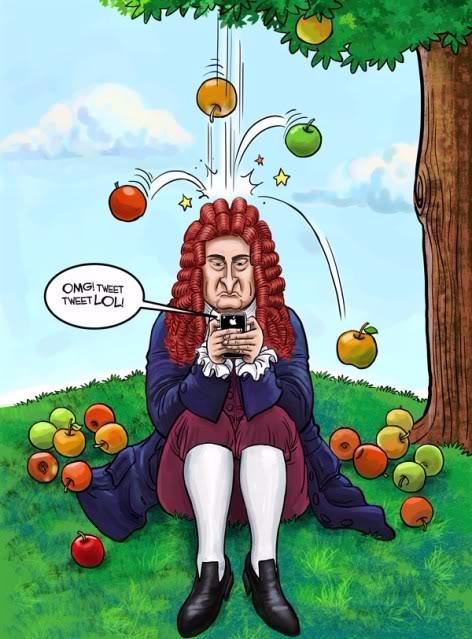

"Why should that apple always descend perpendicularly to the ground," thought he to himself: Occasion'd by the fall of an apple, as he sat in a contemplative mood: "Why should it not go sideways, or upwards? But constantly to the earths centre? Assuredly, the reason is, that the earth draws it. Amidst other discourse, he told me, he was just in the same situation, as when formerly, the notion of gravitation came into his mind. He recalled, 'After dinner, the weather being warm, we went into the garden, and drank tea under the shade of some apple trees, only he, and myself. Stukely was a good friend of Newton's and a scholar of archaeology. One of the most reputed accounts of Newton and the apple is in William Stukely's Memoirs of Sir Isaac Newton's Life (1752).
#Sir isaac newton discoveries license
Only a year later, Voltaire used his artistic license to parade Newton's magnanimous discovery, in his Essay on Epic Poetry (1727), ‘Sir Isaac Newton walking in his gardens, had the first thought of his system of gravitation, upon seeing an apple falling from a tree.’ Again, Voltaire didn't specify how the apple fell, but specified his gardens in Lincolnshire. In this year of Newton's death, Conduitt wrote, ‘the first thought of his system of gravitation which he hit upon by observing an apple fall from a tree.’ He didn't specify which tree or where the apple fell. The earliest of these accounts was recorded in 1726 in the notes of John Conduitt, a Cambridge student.

Therefore, there exist numerous accounts from his acquaintances and admirers-each recounting a different experience. Isaac Newton, never kept any record of what happened that fateful day in the late 1660s when he was inspired by an apple falling from a tree. The Falling Apple and Discovering Gravity- What really happened? An interesting fact is that the gravity of the moon causes ocean tides! Weight is the force of gravity on an object so if you weigh 100 pounds on Earth, you only weigh 38 pounds on Mars because it has less gravity. He was subsequently baptised on New Year’s Day.Īs the legend goes, a young Isaac Newton was sitting beneath an apple tree contemplating the mysterious universe when suddenly an apple hit him on the head at which point he realised that the same force causing the apple to fall kept the moon falling towards the Earth and the Earth falling towards the sun: ‘Eureka.’ Descendants of the original tree can be found in Cambridge and a piece of the original was even loaned by the Royal Society to NASA who took it into space!Ĭommomorative Apple Tree at Trinity College, Cambridge Isaac Newton, regarded as one of the most influential scientists of all time was actually born on Christmas Day 1642, despite it being converted to January 4th in the New Style (modern) calendar, which had not been adopted in England yet. Newton's Theory of Gravity and the Apple Tree laminate.Newton's Scientific Discoveries For Schools Powerpoint (pdf).Newton's Scientific Discoveries For Schools Powerpoint (ppt).
#Sir isaac newton discoveries pdf
On a visit to his mother's garden during his Cambridge days in the late 1660s, he observed a green apple fall from a tree and only then began to consider the mechanism that drove what is now termed Gravity.ĭo please download the pdf or full powerpoint presentation illustrating this subject which you will find useful to use for a class: This tree is a grafted descendant of the original one at the home of Sir Isaac Newton's mother in Woolsthrope, Lincolnshire. But in just half a century, this grand myth was woven by his admirers from its original simple story. In fact, no such tree existed in Cambridge at the time. As entertaining as this tale is, Newton was not struck on the head by an apple and he was not underneath this tree. ‘Eureka’, he cried, and Gravity was discovered. On a warm evening in 1666, just after dinner, the soon to be famous Isaac Newton sat down beneath this tree outside of Trinity to mull over his thoughts, when all of a sudden he was struck on the top of his head by a large, red apple. Newton's Incredible Scientific Discoveries: Myth, Inspiration and Technology SHORT SUMMARY:


 0 kommentar(er)
0 kommentar(er)
